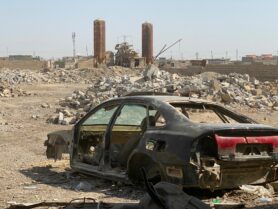From Raqqa, Mariupol to Rafah, we have witnessed the devastating impact of aerial bombardments on civilian harm. In their latest academic article in Antipode, IRW’s Lauren Gould and Jolle Demmers – together with their colleagues from NGO PAX Erin Bijl and Saba Azeem – argue that to understand the true impact of 21st century warfare we have to move beyond producing knowledge on civilian casualty numbers. Instead, they conceptualise and put forward a new and broader transdisciplinary research agenda on civilian harm.
Through on-the-ground research, they empirically illustrate how a US-led bombing campaign against the ISIS-held city of Hawija, Iraq, did not merely provoke harm instantly; its impact reverberates and compounds. This approach enables them to advance a de-militarised ontology of war, which highlights that the impact of remote warfare is not instant, precise, and surgical. Instead, it is essentially centred on multiple ways of “undoing”: not merely the undoing of bodily and material life, but also the undoing of the human ability to seek redress and speak back. With this they—however briefly—open debates on lines of responsibility and political accountability.
Click on the following reference to read the full article:
Gould et el. (2025) Investigating Remote Warfare as the Radical Undoing of Life: The Compounding Civilian Harm Effects of US-Led Coalition Bombings in Iraq. Antipode: 1-22.



